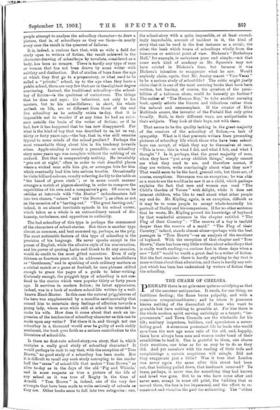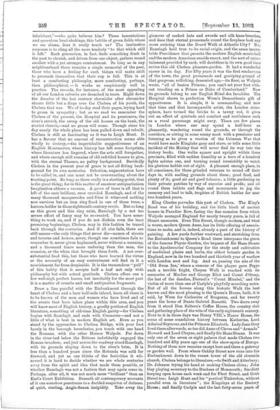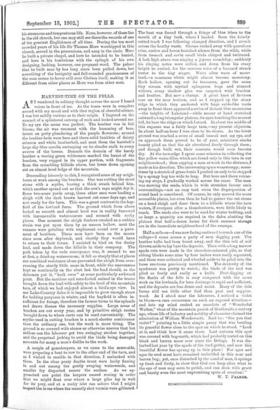THE CHARM OF CHELSEA.
PERHAPS there is no grievance quite so satisfying as that of the amateur antiquarian. It needs, for one thing, no factitious feeding ; the flame burns palpably, and with a conscious companionableness; and he whom it possesses knows nothing of the discomfort of those who want to grumble but have nothing to grumble at. For him there is the whole modern spirit serving enticingly as a target; " im- provements " and Town Councils are the windmills for his tilt; sanitary inspectors, builders, and speculators a never- failing goad. A strenuous protestant life he leads who would save from the new age some relic of the old, and, happily, there have always been men and women under bond of their sensibilities to lead it. One is grateful to them, one shares their emotions, one tries as far as may be to do as they did. And yet somehow with the reading of their toils and complaining. a. certain scepticism will mingle. Did not they exaggerate just a little ? Was it true that London was never again the same after this street had been cut, that building pulled down, that landmark removed ? To them, perhaps, it never was, for something they had known and loved was gone. But to us who have come after and never seen, except in some old print, the building that so moved them, the loss is too impersonal, and the effort to re- construct and visualise the past too exhausting. The "oldest
inhabitant,"—who quite believes him ? These lamentations and querulous head-shakings, this babble of green fields where we see slums, does it really touch us ? The instinctive response is to cling all the more tenderly "to that which still is left." Each generation, in fact, finds something fresh in the past to cherish, and driven from one object, gathers round another with a yet stronger contentment. So long as in any neighbourhood there remains a single memorial of the past, those who have a feeling for such things will make shift to persuade themselves that their cup is full. This is at least a comforting philosophy, more comforting, perhaps, than philosophical, — it works so suspiciously well in practice. The records, for instance, of the most appealing of all our London suburbs are drenched in tears. Right down the decades of the last century chronicler after chronicler chants little but a dirge over the Chelsea of his youth, the Chelsea that was. We of to-day read their pages, trying hard to groan in sympathy ; but as we read we remember the Chelsea of the present, the Hospital and its pensioners, the river's stretch, the sweep of the old houses on the bank, the storied church,—and no groan will come. Though since his day nearly the whole place has been pulled down and rebuilt, Chelsea is still as fascinating as it was to Leigh Hunt. It has a flavour that no amount of reconstruction seems able wholly to destroy,—the imperishable suggestiveness of an English Montmartre, where history has left some footprints, where literature has lingered, where the arts still foregather, and where enough still remains of old red-tiled houses to give, with the eternal Thames, no paltry background. Decidedly Chelsea in the present year of grace is not all fitting back- ground for its own memories. Selection, augmentation have to be called in, and one must not be over-exacting about the Etarting-point. So long as there really is a starting-point, that is the great thing; for in this matter of amateur antiquarianism
• imagination abhors a vacuum. A grove of trees is all that is left of the once brilliant, once crowded Ranelagh, and of the many thousand masquerades and fetes it witnessed nothing now survives but an iron ring fixed in one of these trees, a lantern-holder in those eighteenth-century revels. But so long as this grove arid this ring exist, Ranelagh by a not too severe effort of fancy may be re-created. You have some- thing to work on, and if you do not disdain even the least promising beginnings, Chelsea may in this fashion be traced back through the centuries. And if all else fails, there are still names—the only things that never die—names of streets and taverns and houses, nevcr, though one sometimes fails to remember it, never given haphazard, never without a meaning, and a thousand times more enduring than the man, the occasion, or the whim that brought them forth. A not over- substantial food this, but those who have learned the virtue or the necessity of an easy contentment will find in it a nourishment far from despicable. It is the tremendous "pull" of this hobby that it accepts half a loaf not only with philosophy but with actual gratitude. Chelsea offers one a few well-nigh perfect loaves, but inevitably for the most part it is a matter of crumbs and small antiquarian fragments.
Draw a line parallel with the Embankment through the heart of Chelsea and a bare half-mile inland, learn all there is to be known of the men and women who have lived and of the events that have taken place within this area, and you will know most of English history, a goodly portion of English literature, something of old-time English gaiety—for Chelsea begins with Ranelagh and ends with Cremorne—and not a little of what is best in modern English art. Even as you stand by the approaches to Chelsea Bridge, with your foot barely in the borough boundaries, you touch with one hand the Romans, with the other Horace Walpole. For down in the river-bed below the Britons indubitably engaged the Roman invaders; and just across the roadway stood Ranelagh, with its grounds sloping down to the river's brim. It is less than a hundred years since the Rotunda was sold for firewood, and yet as one thinks of the festivities it wit- nessed it is hard to decide whether we are whole centuries away from the spirit and idea that made them possible, or whether Ranelagh was not a fashion that may again come in. Perhaps, after all, it was not much more "brilliant" than an Earl's Court Exhibition. Beneath all contemporary accounts of it one somehow penetrates to a decided suspicion of dulness, of quiet, sterling, Anglo-Saxon insipidity. Take away the glamour of cocked hats and swords and silk knee-breeches, and does that eternal promenade round the fireplace look any more enticing than the Board Walk at Atlantic City P No; Ranelagh held true to its racial origin, and the same inscru- table Providence that permits the modern English music-hall and the modern American seaside resort, and the sort of enter- tainment provided by each, will doubtless in its own good time revive this old Chelsea pleasure-garden. It had a wonderful
career in its day. For fifty years it was the first rendezvous of the town, the great promenade and gossiping-ground of that gorgeous, rollicking, demented age,—its floor, as Walpole wrote, "all of beaten Princes ; you can't set your foot with- out treading on a Prince or Duke of Cumberland." Now its grounds belong to our English Hotel des Luvalides. The Hospital shows to perfection Wren's Demosthenic gift of appositeness. It is simple, it is commanding, and now that time and that incomparable artist, the London atmo- sphere, have turned the bricks to a tawny red, it gives out an effect of quietude and comfort and restfulness such as a rural parsonage might envy. There are few places in London where one may spend a half-hour so pleasantly, wandering round the grounds, or through the corridors, or sitting in some sunny nook with a pensioner and listening as he gives a version of the Crimean War that would have made Kinglake gasp and stare, or tells some little incident of the Mutiny that will never find its way into the history books. One walks square and upright within these precincts, filled with sudden humility as a hero of a hundred fights salutes one, and turning round irresistibly to watch his glorious hobble out of sight. A pleasant enough place, in all conscience, for these grizzled veterans to round off their days in, with smiling grounds about them ; good food, and plenty of it; good air and good tobacco; a little gardening on their private patches by way of exercise and profit; and all round them tablets and flags and monuments to jog the memory and lead to talk, trophies of British battles for near two hundred years.
King Charles pervades this part of Chelsea. The King's Road was of his building, and the little block of ancient houses in Paradise Row, facing the fine mansion from which Walpole managed England for nearly twenty years, is full of Stuart memories. Even Tite Street, though modern, and what is worse, modern Queen Anne, has its little offering of associa- tions to make, and is, indeed, already a part of the history of painting. A few yards further westward, and stretching from the Embankment to Queen's Road there interposes the green of the famous Physic Garden, the bequest of Sir Hans Sloane to the Apothecaries' Company for the study and cultivation of medicinal plants and herbs, the oldest botanic garden in England, now in its two hundred and thirtieth year of warfare with London soot and fog. And so, passing the site of the Old Swan Inn,' where a rumour of the plague gave Pepys such a terrible fright, Cheyne Walk is reached with its memories of MacRae and George Eliot and Count d'Orsay, the last of the dandies, Disraeli's "Count Mirabel," and the victim of more than one of Carlyle's playfully scorching notes. But of all the houses along this historic Walk the beet known and the most pleasing is the Queen's House, built, it is said, by Wren for Catherine of Braganza, and for twenty years the home of Dante Gabriel Rossetti. Two doors away from it stood Don Saltero's Coffee House, the country club and gathering-place of the wits of the early eighteenth century.
Next to it in those days was Henry Manor House, the scene of some scandalous history between Katherine, Lord Admiral Seymour, and the Princess Elizabeth. Lady Jane Grey lived there afterwards, so too did Anne of Cleves and "Armada" Howard and Lord Cheyne, and finally Sir Hans Sloane. It was only one of the seven or eight palaces that made Chelsea two hundred and fifty years ago one of the show-spots of Europe. Nothing of them now remains except here and there a gateway or garden wall. From where Oakley Street now runs into the Embankment down to the russet tower of the old riverside church, Chelsea belongs to literature,—to Swift and Atterbury ; Dr. Johnson trying his hand at making Chelsea china; John Gay playing secretary to the Duchess of Monmouth ; Smollett keeping open house each week-end for Fleet Street, and Grub Street too; Leigh Hunt and his "poetical Tinkerdom, without parallel even in literature " ; the Kingsleys at the Rectory House ; and finally Carlyle and the last forty-seven years of
his strenuous and tempestuous life. None, however, of these lies in the old church, but one may still see there the records of one of the greatest Englishmen of all time. During the ten most crowded years of his life Sir Thomas More worshipped in this church, served in the processions, and sang in the choir. Here he built a private chapel, and here he intended to be buried, and here is his tombstone with the epitaph of his own designing, lacking, however, one pregnant word. The palace that he built near by has long since been pulled down, but something of the benignity and full-rounded graciousness of the man seems to hover still over Chelsea itself, making it as different from other places as More was from other men.








































 Previous page
Previous page